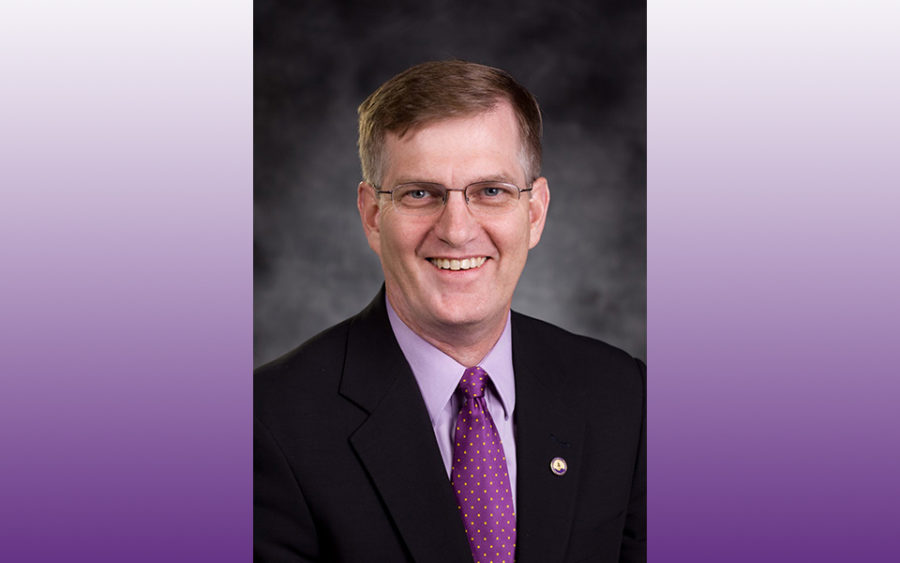Mark Nook named UNI’s 11th President
Dec 6, 2016
Mark Nook, an Iowa native and former chancellor of Montana State University Billings (MSUB), has been named UNI’s 11th President.
“This university has done amazing work,” Nook said in a brief acceptance speech. Cheryl and I are very excited for this opportunity to work with you and continue that amazing work to build this university, help support this state and to continue to educate Iowans.”
Nook, a native of Holstein, holds his Ph.D. in Astronomy, and obtained his M.S. degree in Astrophysics from Iowa State University. He served as chancellor of MSUB from 2014 to 2016.
He beat out candidates Neil Theobald, former Temple University president, and Jim Wohlpart, UNI’s current interim president.
The Board of Regents approved Nook’s hiring unanimously. Many have said Nook’s experience as a university president is what won out the Board’s support. (The chancellor position is the equivalent of a university president.)
Nook is scheduled to assume Presidential duties on Feb. 1 of 2017. on February 1, 2017. He will receive a three-year contract and will be paid an annual salary of $357,110.
Board of Regents President Bruce Rastetter said he expected Wohlpart to continue interim duties through Feb. 1.
“We’re asking Wohlpart to stay on as interim until then and to continue on as provost and working with the new president,” Rastetter said.
Dozens gathered in the Maucker Union to hear the announcement. Nook received cheers, applause and a standing ovation.
In a press release, Joe Gorton, president of UNI’s faculty union, expressed strong support for the choice.
Becky Hawbaker, vice president of UNI’s faculty union, served on the search committee. She said the faculty union at MSUB “had nothing but positive things” to say about Nook.
“We’re most proud of the process,” Hawbaker said. “And that this process was so different from what occurred at the University of Iowa. We are very thankful … to the Regents for making sure that this process was open, transparent and fair.”
Many have criticized the Regent’s search practices in hiring Bruce Harreld as the University of Iowa president in November of 2015.
Andrew Jessip, a junior global studies major, attended Nook’s open forum presentation. He said Nook’s experience and “action” set him up as “stiff competition” for Wohlpart, who Jessip initially thought the Board might select.
“Obviously Jim has a really strong connection here,” Jessip said of Wohlpart. “And I don’t expect anything to change with Jim [and his role here].”
Jessip said a major challenge facing Nook is to understand the complex issues of diversity at UNI. Jessip said Wohlpart had the advantage of having participated in the dialogues around this issue on campus in the past two years.
“We’re in such a complicated situation that it’s going to be hard not only to come into it, but also to be able to fully grasp what it is that students want and what faculty want.”
Jessip said he hopes Nook will look to Wohlpart’s “wealth of knowledge” on the issue at UNI.
Nook said UNI has “stepped up” to address issues related to diversity, citing its place in the university’s strategic plan.
“In the strategic plan, it’s goal one,” Nook said. “The goal is to improve diversity and make sure it’s inclusive. But not only do we bring students in from diverse backgrounds, we make sure they’re successful when they get here at the same rates as any other student.”
Nook said he’ll work with those at UNI know the issue to make sure everyone is engaged in the issue.
“I’m willing to drive change that’s absolutely essential, but … I see there’s a commitment by most of the people on campus to make this happen,” Nook said.
MSUB is similar to UNI in that it emphasizes teacher preparation and focuses on liberal arts, according to Nook’s curriculum vitae. MSUB’s enrollment is around 4,400 students.
According to the Billings Gazette, MSUB faced declining enrollment numbers under Nook’s time as chancellor. Enrollment took a nearly 4 percent hit in 2014-15, followed by a 7 percent decline in 2015-16.
UNI’s enrollment has been relatively stagnant in the last three years, but is showing trends toward improvement.
“We’ve got to … take advantage of the opportunities we have; get out in the community and let them know the great stuff that’s going on here,” Nook said.









